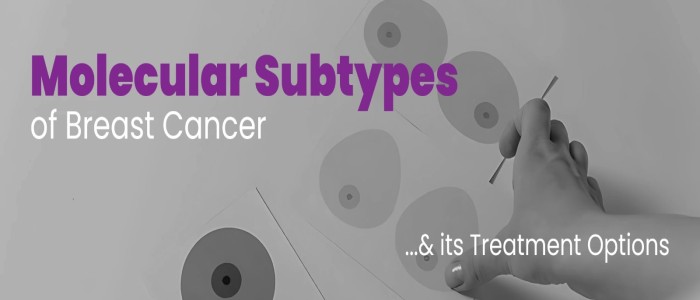Admin
17 October, 2024
Molecular Subtypes of Breast Cancer & its Treatment Options
Molecular subtyping divides breast cancer into different groups based on the presence or absence of three key receptors: estrogen receptor (ER), progesterone receptor (PR), and human epidermal growth factor receptor 2 (HER2). These receptors play crucial roles in how breast cancer grows and responds to treatments:
- ER (Estrogen Receptor): If the cancer cells have estrogen receptors, they are called ER-positive. These cancers often grow in response to estrogen.
- PR (Progesterone Receptor): PR-positive cancers grow in response to progesterone, a hormone that works in conjunction with estrogen.
- HER2 (Human Epidermal Growth Factor Receptor 2): HER2-positive cancers have too much of the HER2 protein, which promotes the growth of cancer cells.
The presence or absence of these receptors helps categorize breast cancer into the following common molecular subtypes:
1. Luminal A
Luminal A tumors are ER-positive and/or PR-positive, HER2-negative, and have low levels of a protein called Ki-67, which indicates how fast the cancer cells are growing.
Treatment Options:
- Hormone Therapy: The primary treatment is hormone therapy, which either blocks estrogen receptors or reduces estrogen levels. Since Luminal A tumors are typically estrogen receptor (ER) and/or progesterone receptor (PR) positive, hormone therapy is highly effective.
- Additional Treatments: Depending on individual risk factors, surgery (such as a lumpectomy or mastectomy) and radiation therapy may be recommended. Chemotherapy is generally not necessary due to the slow growth of these tumors.
2. Luminal B
Luminal B tumors are also ER-positive and/or PR-positive but can either be HER2-positive or HER2-negative. These tumors typically have higher levels of Ki-67, meaning they grow faster than Luminal A tumors.
Treatment Options:
- Hormone Therapy: Like Luminal A, hormone therapy is used because these tumors are also ER-positive and/or PR-positive.
- Chemotherapy: More likely to be needed than for Luminal A tumors, particularly if the tumor is more aggressive or has a higher growth rate, indicated by markers like Ki-67.
- HER2-Targeted Therapy: If the tumor is HER2-positive, targeted therapies are added to block the HER2 protein, which fuels cancer growth.
3. HER2-Enriched
HER2-enriched tumors are ER-negative, PR-negative, but HER2-positive. They tend to grow quickly and can be more aggressive, but they often respond well to HER2-targeted therapies.
Treatment Options:
- HER2-Targeted Therapy: The key treatment is HER2-targeted therapy, which blocks the HER2 protein on the cancer cells, slowing or stopping their growth.
- Chemotherapy: Typically combined with HER2-targeted therapy to maximize effectiveness, especially if the tumor is high-risk or large.
- Additional Treatments: Surgery and radiation therapy may also be part of the treatment plan, particularly if the tumor has spread to nearby tissues.
4. Triple-Negative Breast Cancer (TNBC)
TNBC is ER-negative, PR-negative, and HER2-negative, meaning it doesn’t have any of the receptors that most treatments target. This subtype makes up about 10-20% of breast cancers and is more common in younger women, particularly those of African descent or with BRCA1 mutations.
Treatment Options:
- Chemotherapy: Since TNBC does not have ER, PR, or HER2 receptors, hormone therapies and HER2-targeted treatments are not effective. Chemotherapy is the primary treatment, often used before or after surgery to shrink the tumor or reduce the risk of recurrence.
- Immunotherapy: In some cases, immunotherapy may be combined with chemotherapy to enhance the body's immune response against the cancer.
- PARP Inhibitors: For patients with BRCA1 or BRCA2 mutations, PARP inhibitors may be used to block cancer cells from repairing DNA damage, leading to their destruction.
- Additional Treatments: Surgery and radiation therapy are frequently part of the treatment approach, especially for localized tumors.
If you have any uncertainties or seek a better understanding of breast cancer, we invite you to reach out to CION Cancer Clinics. Our team is here to assist you. Feel free to contact us at 1800 120 2676, or you can conveniently fill out the form through the provided link.
Why Choosing CION Cancer Clinics is the Right Decision for You?
Finding the Best Cancer Hospital in Hyderabad, is a crucial step in your cancer journey. The right hospital can provide you with the best care, from diagnosis to treatment and recovery.
At CION Cancer Hospital, we understand the challenges of a cancer diagnosis, and our commitment is to empower you to take control of your life throughout your cancer treatment. Our cancer specialists in Hyderabad are dedicated to providing individualised and holistic care, ensuring you receive the best possible treatment and support.
Facing cancer is undeniably daunting. However, with the right care and support, it becomes a journey that is more manageable and filled with hope. Access to cutting-edge treatments and a robust support network, both medical and emotional, empowers individuals to face the challenges of cancer with determination and optimism.



